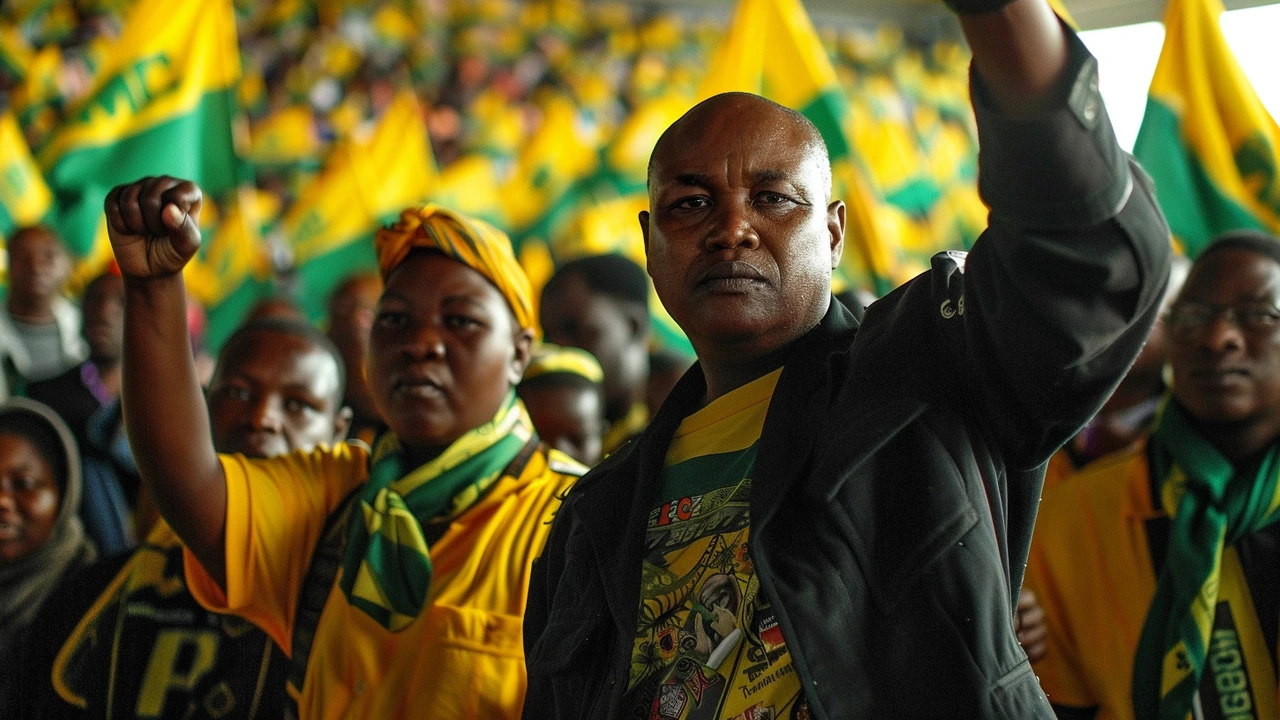Thousands Gather to Support ANC at FNB Stadium
This weekend, the FNB Stadium in Soweto was a sea of green, black, and gold as thousands of African National Congress (ANC) supporters gathered for the party's final election rally. The atmosphere was electric, filled with music, dancing, and a sense of camaraderie. The event was not just a rally but a celebration, a reflection, and an affirmation of loyalty to a party that has held the reins of power for 30 years.
Among the throng, many supporters were eager to express their satisfaction with the ANC's long governance, despite the evident challenges the country faces. They admitted to the party's mistakes but were quick to defend it from criticism that it had achieved nothing during its time in power. Education, housing, and social welfare emerged as the cornerstones of their defense. Anecdotes of better living conditions and opportunities for the younger generation were common.
Achievements Highlighted by Supporters
Standing amidst the noise and fervor, it was clear that education was a significant point of pride for the ANC's loyalists. Numerous supporters spoke about the increased access to education, especially for previously marginalized communities. Schools have been built, and the younger generation now has more opportunities than their predecessors did. This rise in educational infrastructure has been lauded as one of the ANC's more tangible achievements.
Housing development was another key topic. Supporters pointed out the numerous housing projects initiated over the years, providing homes for thousands of families. These homes symbolized more than just shelter; they represented stability and security, a critical necessity in these tumultuous times. Social grants too were highlighted as a lifeline for many South Africans struggling to make ends meet. These grants have played an essential role in reducing extreme poverty, particularly among the elderly and children.
Challenges Persist
However, it's impossible to ignore the elephant in the room - the persistent socio-economic challenges that continue to plague South Africa. High unemployment rates, ongoing load shedding, and rampant crime cast long shadows over the ANC's achievements. The unemployment rate remains a significant issue, affecting millions and creating a sense of uncertainty about the future. Many in attendance acknowledged these problems but argued that the ANC was better equipped to address them than any other party.
Load shedding has become a particular point of contention, with many criticizing the government's handling of the country's energy crisis. Despite these criticisms, some supporters argued that the root causes of the crisis were complex and would take time to resolve. They maintained faith that the ANC would eventually find lasting solutions.
Ramaphosa's Address
Anticipation built as the day progressed, and all eyes turned to the stage, awaiting President Cyril Ramaphosa's address. As ANC President, Ramaphosa was expected to rally the supporters and galvanize them for the upcoming election. His speech was seen as crucial in setting the tone for the ANC's final push in their campaign.
The party's Head of Elections, Mdumiseni Ntuli, had earlier expressed confidence in a packed stadium by the time Ramaphosa took the podium. He wasn't wrong. The stadium was filled to near capacity, a testament to the enduring loyalty of the ANC's support base. Ramaphosa's speech touched upon the party's achievements and addressed the challenges head-on, promising continued commitment to resolving the nation's issues.
Looking Ahead
As the rally wrapped up, supporters left with renewed energy and a fortified belief in their party. The ANC's 30-year reign has been a complex tapestry of triumphs and tribulations, but for many gathered at the stadium, the scales tipped favorably towards the former. As the country heads towards the elections, the hope is that the party can continue to build on its achievements while addressing the challenges collaboratively and transparently.
The FNB Stadium event served as a microcosm of the broader national sentiment — a mix of satisfied retrospection and cautious optimism for the future. It remains to be seen how the ANC will fare at the polls, but one thing is clear: their supporters are standing steadfast, fueled by a legacy of change and a desire for continued progress.







Eduardo Lopez
It's astonishing how the ANC's three decades in power have become a litmus test for national conscience. The sheer scale of educational infrastructure erected under its banner is a testament to a vision that transcended mere political expediency. Yet, any celebration must be tempered by the moral imperative to confront the deep inequities that persist. When thousands don the green, black, and gold, they embody not just loyalty but an expectation that the party will uphold the very ideals it once championed. The housing projects, while laudable, cannot mask the ongoing displacement of vulnerable communities. Social grants, a lifeline for many, also reveal the fragility of a system that leans heavily on state welfare. Load shedding looms as a stark reminder that technological stewardship has been neglected in favor of short‑term gains. Unemployment, a specter that haunts the youth, underscores the necessity for robust job creation policies. The rally's electric atmosphere, drenched in music and dance, should not distract from the hard truths that demand action. President Ramaphosa's address must therefore move beyond rhetoric and outline actionable steps. The ANC's legacy is a tapestry woven with triumphs and tribulations, each thread demanding accountability. As citizens, we are called to scrutinize, to challenge, and to demand transparency. The future hinges on whether the party can transform nostalgic fervor into concrete reforms. In this pivotal moment, the party's moral compass is being tested more rigorously than ever. Let us hope that the echoes from Soweto translate into policy that genuinely lifts the nation.
Nancy Perez de Lezama
The rally showcases a remarkable show of unity among supporters, yet the underlying challenges cannot be ignored. Education and housing advancements are commendable, but persistent unemployment remains a critical issue. It is essential that the party addresses these concerns with concrete strategies.
Matt Heitz
While the emotional fervor of the crowd is palpable, the discourse must pivot to a data‑driven assessment of macro‑economic indicators. Structural load‑shedding, for instance, derives from systemic infrastructure underinvestment-a fact that the ANC must acknowledge unequivocally. Moreover, the employment deficit reflects labor market rigidity exacerbated by policy inertia. From a nationalist perspective, safeguarding energy sovereignty is non‑negotiable, demanding swift capital infusion into renewable grids. The moral narrative you present, though impassioned, should be anchored in measurable outcomes and timeline commitments. Only then can the party’s legacy be validated beyond symbolic gestures.
Susan Mark
According to recent Statistics South Africa reports, the graduation rate increased by 12% over the past decade, indicating progress in educational access. Housing delivery, as per the Department of Human Settlements, reached 1.1 million units in 2023, which demonstrates tangible outcomes. However, the national unemployment rate still hovers around 30%, highlighting a gap that requires targeted skills development programs. Balancing these metrics can help the ANC formulate policies that address both achievements and persisting challenges.
Jason Jennings
These rallies only mask the party’s systemic failures.